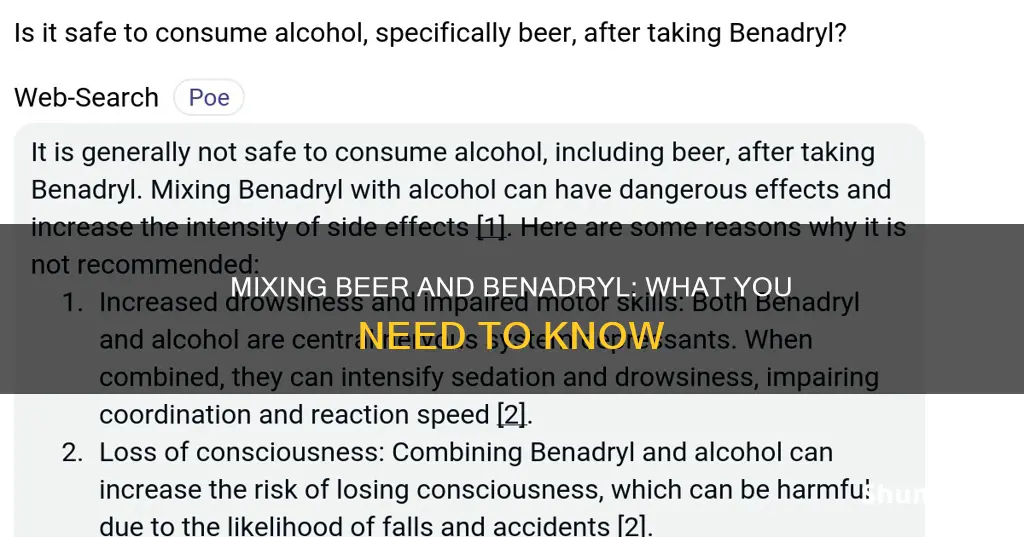
Drinking alcohol and taking Benadryl is not recommended as it can cause severe side effects. Both substances are central nervous system (CNS) depressants, which means they slow down the CNS. This can lead to decreased heart rate, slow breathing, loss of consciousness, and even coma in rare cases. Taking Benadryl with alcohol can also cause dangerous levels of drowsiness and sedation, making it difficult to perform daily activities such as driving or operating heavy machinery. Additionally, there is a risk of dehydration, memory impairment, and negative interactions with other medications. While the risks may vary depending on individual factors, it is generally advised to avoid mixing Benadryl and alcohol.
| Characteristics | Values |
|---|---|
| CNS Depressants | Both Benadryl and Alcohol are central nervous system (CNS) depressants. |
| Side Effects | Taking Benadryl and Alcohol together can worsen side effects like drowsiness, sedation, dizziness, nausea, and difficulty with cognitive tasks. |
| Loss of Consciousness | Some people are more prone to losing consciousness when sedated. For these people, mixing Benadryl and Alcohol can lead to a loss of consciousness, which increases the risk of falls and accidents. |
| Dehydration | Both Benadryl and Alcohol are known to dehydrate the body, and mixing them can increase the risk of dehydration and worsen a hangover. |
| Complications in Older Adults | Aging slows down the body's ability to break down Alcohol, increasing the time it stays in the system and prolonging the risk of harmful interactions with Benadryl. |
| Learning and Memory Impairment | Benadryl and Alcohol both inhibit learning and memory temporarily. Combining them may have a more noticeable effect on these cognitive functions. |
| Drug Interactions | Benadryl may interact with other medications, such as cough and cold medicine, stomach ulcer medicine, and other antihistamines. Taking these medications with Alcohol could further increase the risk of side effects. |
| Other Sources of Alcohol | Some medications, like cough syrup and laxatives, contain Alcohol (up to 10%). Taking these with Benadryl may increase the risk of adverse interactions even with small amounts of Alcohol. |
| Gender Differences | Females are generally more susceptible to alcohol-related harm due to lower water content in their bodies, making the same amount of Alcohol more concentrated. Therefore, mixing Benadryl and Alcohol is more hazardous for females. |
| Sleep Aid | While Benadryl and Alcohol can induce drowsiness, exploiting this combination as a sleeping aid may worsen other side effects like dizziness and nausea, interfering with sleep. |
| Dementia | Long-term, excessive consumption of Benadryl and Alcohol may be linked to an increased risk of dementia, but more studies are needed to establish a direct causal relationship. |
What You'll Learn
- Benadryl and alcohol are central nervous system (CNS) depressants
- CNS depressants slow down the CNS, causing drowsiness and impaired coordination
- Mixing Benadryl and alcohol can lead to loss of consciousness
- Both substances dehydrate the body, increasing the risk of dehydration
- The combination can cause learning and memory impairment

Benadryl and alcohol are central nervous system (CNS) depressants
Benadryl (diphenhydramine) and alcohol are central nervous system (CNS) depressants. This means that they slow down the CNS, which is made up of the brain and spinal cord. When taken together, they can slow down the CNS too much, causing a range of side effects and increasing the risk of accidents and overdose.
The CNS depressant effects of Benadryl and alcohol can lead to heightened side effects such as drowsiness, dizziness, impaired coordination, and sedation. This combination can make it difficult to perform physical and mental tasks that require alertness, such as driving or operating machinery. It can also increase the risk of falls, especially in older adults. Additionally, both substances are known to dehydrate the body, and mixing them can further increase the risk of dehydration, worsening any hangover effects.
The combination of Benadryl and alcohol can also lead to respiratory depression and other life-threatening problems. It may also increase the risk of loss of consciousness, blurred vision, seizures, and even death. As such, it is medically advisable to abstain from alcohol completely while taking Benadryl.
Furthermore, Benadryl may interact with other medications, including cough and cold medication, stomach ulcer medicine, and other antihistamines. Some of these medications may contain alcohol, which can further increase the risk of adverse effects when mixed with Benadryl. It is important to read the labels of all medications and consult a doctor or pharmacist to ensure safe use.
While the risks associated with mixing Benadryl and alcohol may not apply to all scenarios, it is generally safest to abstain from alcohol while taking Benadryl to avoid any potential dangers.
Beer and Prediabetes: What's the Verdict?
You may want to see also

CNS depressants slow down the CNS, causing drowsiness and impaired coordination
Drinking alcohol and taking Benadryl can be dangerous as both are central nervous system (CNS) depressants. CNS depressants slow down the CNS, causing drowsiness and impaired coordination.
The CNS is made up of the brain and spinal cord. CNS depressants like Benadryl and alcohol slow down the CNS, which can lead to serious side effects. One of the main side effects is drowsiness, which can be dangerous if it occurs during activities that require alertness, such as driving or operating heavy machinery. The combination of Benadryl and alcohol can also cause sedation, dizziness, and impaired physical and mental tasks.
The impact of CNS depressants is more pronounced in older adults, as their bodies take longer to break down alcohol. As a result, older adults are more susceptible to the harmful interaction between Benadryl and alcohol. Additionally, females tend to experience alcohol-related side effects more than males due to the difference in water content in their bodies.
Benadryl and alcohol can also negatively interact with other medications, such as cough and cold medicines, stomach ulcer medicines, and other antihistamines. This can further increase the risk of adverse side effects. It is important to note that Benadryl should only be used for treating allergy symptoms and not as a sleep aid, as it can interfere with sleep due to side effects like nausea and dizziness.
While the combination of Benadryl and alcohol can be dangerous, it is important to note that consuming small amounts of alcohol while taking Benadryl in a safe and supervised environment may not cause any harm. However, the safest option is to refrain from drinking alcohol while taking Benadryl. If you are unsure, it is best to consult a doctor for advice.
Beer Traps: Effective Earwig Control or Urban Myth?
You may want to see also

Mixing Benadryl and alcohol can lead to loss of consciousness
Benadryl (diphenhydramine) is a brand-name antihistamine that can be purchased over the counter to treat allergy symptoms. It is a central nervous system (CNS) depressant, which means it slows down the CNS, which is made up of the brain and spinal cord.
Alcohol is also a CNS depressant. Taking Benadryl and consuming alcohol at the same time can lead to the CNS being slowed down too much, causing sedation, drowsiness, and impaired coordination and reaction speed. This can be extremely dangerous, especially when performing activities that require alertness, such as driving or operating heavy machinery.
Some people may be more prone to losing consciousness when sedated. For these individuals, mixing Benadryl and alcohol increases the risk of losing consciousness, which can be harmful due to the likelihood of falls and other accidents.
Combining Benadryl and alcohol can also cause dehydration, which may worsen a hangover. Additionally, both substances are known to inhibit learning and memory temporarily.
It is important to note that Benadryl is intended to treat only allergy symptoms and should not be used as a sleep aid, despite its drowsiness side effect. Misusing Benadryl in this way, especially in combination with alcohol, can lead to dizziness and nausea, disrupting sleep rather than aiding it.
To avoid the dangers associated with mixing Benadryl and alcohol, it is best to abstain from alcohol while taking Benadryl. Consult a doctor or pharmacist to determine when it is safe to consume alcohol after taking Benadryl, as this may depend on individual factors such as age and other medications.
Kayaking and Beer: New Hampshire's Legal Limits
You may want to see also

Both substances dehydrate the body, increasing the risk of dehydration
Drinking alcohol and taking Benadryl can both cause dehydration, and combining the two can increase the risk of dehydration. Both substances are known to dehydrate the body. When mixed, the effects and risks of dehydration are doubled. Dehydration can cause discomfort and may worsen a hangover.
Alcohol is a diuretic, which means it increases the production of urine. This can lead to dehydration if not enough fluids are consumed. Beer, in particular, is known to be diuretic due to its high concentration of alcohol.
Benadryl, on the other hand, can cause dehydration by inhibiting the body's antidiuretic hormone (ADH), which regulates water retention. This inhibition can lead to increased urine production and fluid loss, resulting in dehydration.
When alcohol and Benadryl are consumed together, the dehydrating effects of both substances are combined, leading to an increased risk of dehydration. This can be particularly problematic for older adults, as aging slows the body's ability to process and break down alcohol, prolonging the dehydrating effects.
Additionally, dehydration can affect cognitive function, further impairing an individual's daily functioning. The combined impact of alcohol and Benadryl on the central nervous system can lead to side effects such as drowsiness, sedation, and impaired coordination and reaction speed. These side effects can be life-threatening if they occur during activities that require mental alertness and coordination, such as driving or operating heavy machinery.
Therefore, it is important to avoid mixing alcohol and Benadryl to reduce the risk of dehydration and other harmful side effects. It is always advisable to consult a doctor or pharmacist if you have any concerns or questions about the safety of combining medications and substances.
Hand-Pulled Beer Pumps: Traditional, Unique, and Fun!
You may want to see also

The combination can cause learning and memory impairment
Benadryl and alcohol are both central nervous system (CNS) depressants, which means they slow down the CNS. When combined, they can cause severe side effects, including drowsiness, sedation, and trouble with physical and mental tasks. This can impair a person's daily functioning, especially when performing activities that require alertness, such as driving or operating heavy machinery.
Additionally, Benadryl blocks the action of acetylcholine, a neurotransmitter necessary for learning and memory. Alcohol also inhibits learning and memory temporarily. Therefore, combining Benadryl and alcohol may have a more pronounced and detrimental impact on cognitive functions, including learning and memory.
The combination of Benadryl and alcohol can lead to dangerous levels of sedation and drowsiness, making it challenging for individuals to maintain their daily activities. This can be particularly risky for older adults, as aging slows down the body's ability to break down alcohol, increasing the likelihood of negative interactions between Benadryl and alcohol.
It is important to note that consuming small amounts of alcohol while taking Benadryl may not cause any harm. However, due to the potential risks involved, it is generally recommended to abstain from alcohol while taking Benadryl to ensure safety.
Mixing Beer and Adderall: What You Need to Know
You may want to see also
Frequently asked questions
No, it is not safe to mix Benadryl and alcohol. Both are central nervous system (CNS) depressants, so taking them together can cause extreme drowsiness and impaired motor skills and alertness.
The combined impact of Benadryl and alcohol on the CNS can produce very dangerous side effects. These include loss of consciousness, dehydration, learning and memory impairment, and negative interactions with other medications.
Yes, older adults and women are more susceptible to the effects of this combination. Older adults have a slower ability to break down alcohol, so it stays in their system longer. Women tend to feel the effects of alcohol more than men because their bodies have less water for the alcohol to mix with.
Ensure you are in a safe environment where you can rest. Do not drive or operate heavy machinery. Consult a doctor to determine when it is safe to consume alcohol after taking Benadryl.







